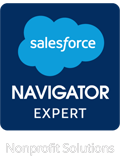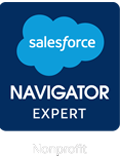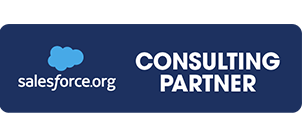Navigating the AI Frontier: What’s Holding Fundraisers Back?
The energy at AFP ICON 2025 made one thing clear: fundraisers are curious—and cautiously optimistic—about AI. Conversations echoed a shared sentiment: AI holds real promise for elevating how we connect with donors, tell our stories, and drive impact. But alongside the buzz, there’s tension. For many AFP members, the excitement is matched with hesitation.
Let’s name what’s possible - and what support fundraisers need to get there.
What Fundraisers Are Really Wondering About AI
1. “Where Do I Even Begin?”
The AI landscape is vast and fast-moving. Between new tools, tech jargon, and integration challenges, many development teams feel overwhelmed. Fundraisers want to use AI, but not at the expense of mission delivery. Without a clear, low-barrier starting point, the path to adoption can feel intimidating or out of reach.
What they need:
- A simple roadmap. For example, start with AI that supports everyday tasks - like writing first-draft emails, organizing donor data, or summarizing reports.
- Peer case studies. Learning from nonprofits of similar size builds confidence and sparks ideas.
- Permission to start small. AI doesn’t have to be all-or-nothing. One pilot project is enough.
2. “Will AI Compromise Our Human Touch?”
Fundraising is built on trust and relationships. The idea of a machine writing thank-you notes or recommending ask amounts raises questions about authenticity. AFP members expressed concerns about losing the personal nuance that makes donor engagement meaningful.
What they need:
- Examples of AI enhancing human connection. Like drafting a personalized email that a fundraiser reviews and tweaks, saving time without losing tone.
- Clear ethical guidelines. Set boundaries: AI supports the work, but never speaks for the organization without review.
- A shared definition of “human-centered AI.” Build alignment internally about what this looks like - and why it matters.
3. “How Do We Protect Our Data and Reputation?”
AI depends on data, but not all data is created equal. Fundraisers are wary of over-relying on historical giving patterns that may be biased or incomplete. There’s also anxiety about donor privacy, especially when third-party AI tools are involved.
What they need:
- A checklist for ethical data practices. Questions to ask vendors, red flags to look for, and internal steps to audit your own data.
- Transparent sourcing. Choose tools trained on data that reflect your values, not just performance.
- Confidence that AI isn’t just safe - it’s aligned with your mission.
4. “We Don’t Have the Staff (or Budget) for This”
Many AFP members come from lean teams wearing multiple hats. There’s a misconception that AI is a luxury reserved for larger orgs with big budgets and in-house tech teams. That myth leads to missed opportunities, and widening gaps between organizations that can and can’t adapt.
What they need:
- Tools that save time now. For example, AI tools that help segment donors or flag lapsed ones, freeing up staff for high-touch outreach.
- Realistic implementation paths. Highlight stories of small-to-mid-sized orgs using free or low-cost tools to test and learn.
- Strategic partnerships. You don’t need to be a tech expert - just choose the right support.
5. “We’re Not Ready - And That’s OK”
Perhaps the most important takeaway from the AFP community: many fundraisers feel like they’re behind the curve, but they’re not alone. AI isn’t a race; it’s a journey. Taking the first step - whether it’s using AI to clean data or draft a campaign email - is enough to start building momentum.
Taking the first step - whether it’s using AI to clean data or draft an appeal - is how momentum builds.
What they need:
- Encouragement, not pressure. Normalize experimentation, learning, and even failure.
- Spaces to share. Peer learning forums where people can trade stories and troubleshoot.
- A reminder that curiosity is a strength. It’s not about knowing everything - it’s about staying open to new ways of doing what matters.
How Idealist Consulting Is Approaching AI for Fundraising
At Idealist Consulting, we believe AI should amplify the work of fundraisers. That’s why we focus on grounding technology in a people-first strategy.
Here’s how we’re helping nonprofits move forward with clarity and confidence:
- AI-readiness assessments to evaluate data quality, integration needs, and ethical concerns
- Use-case design focused on real outcomes, like increasing donor retention or reducing staff burden
- Implementation of Salesforce CRM Analytics (CRMA) for visualizing donor trends and making data-driven decisions
- Fundraiser “co-pilot” tools that support, not replace, your team, like AI-generated content that fundraisers can review and refine
- AI literacy training to ensure staff understand the tools they’re using, and how to use them responsibly
Our approach is grounded in partnership, transparency, and sustainability. We don’t believe in chasing hype - we believe in delivering tools that make fundraisers more effective, informed, and empowered.
Final Thoughts:
AI isn’t a silver bullet - but it can be a powerful ally. As the AFP community explores this evolving space, we invite you to start where you are. With the right partners, data, and mindset, the future of fundraising can be both tech-enabled and deeply human.
Ready to explore what AI could look like at your organization? Let’s start a conversation rooted in your goals, your values, and your people.















